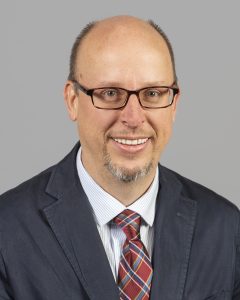When Douglas Haladay, PT, DPT, PhD, CSCS, accepted the appointment as Director of the USF School of Physical Therapy and Rehabilitation Science Director on March 1, 2020, the business policies for USF related to COVID-19 were at the level of restricting business travel. Immediately after stepping into this leadership position, he was faced with rapidly-escalating management and leadership challenges brought on by the COVID-19 pandemic. He had to galvanize our faculty and staff into quickly transitioning our DPT educational program from a hybrid model to a fully-online model, manage the shift of faculty and staff to work remotely, and continue operation of our USF Health Physical Therapy Center in an environment where concerns about the coronavirus dramatically reduced patient volumes. Below is short interview with Dr. Haladay on how he has experienced this unique transition.
What have been some of the challenges of the School during the pandemic?
This transition happened so quickly, and one the major challenges was keeping up with the changes and volume of information while transitioning.
What management skills were needed to transition the DPT program from a hybrid program to 100% online/virtual?
Initially, we needed to have strong planning skills because we developed several plans due to the many unknowns we were presented with in early March, and with this pandemic. However, frequent and transparent communication with faculty, staff, and students was the most important management/leadership skill that has helped ensure a smooth transition.
How have you supported the faculty, staff, and students during this time? How is support of clinical faculty & staff different from support of those whose assignment is primarily academic/research?
In times of uncertainty, it is important to provide information, support, and resources. I tried to focus on the positive and support others by letting them know how much I appreciate their efforts. Clinical, education, and research missions needed to move forward, often in similar but in different ways (e.g., working from home, remote teaching, telehealth, simulation, etc.). In order to support our clinical faculty and ensure the safety of our patients, we had to make some hard decisions early on regarding scheduling. Fortunately, we have an incredible clinical management team to provide additional support to clinical faculty and staff.
Who has supported you, and how?
I have been supported by so many: USF Health leadership, School leadership, faculty, staff, students, peers at other PT programs, as well as family. This support has ranged from listening, to sharing ideas, taking on tasks, and problem-solving. In addition, we have been able to find support in one another through our shared vulnerability in handling this challenging situation.
How do you think providing leadership during this new experience will shape your leadership of the School in the future?
I am more aware of the resilience and potential in the people that make up our community. Our faculty and staff have collaborated more than ever to support our missions and students, our students have become creative in their learning and support of one another, and our clinical team has pivoted to telehealth and social-distancing during in-person appointments. As quoted from Whitney et al. in Appreciative Leadership, “nothing of worth happens without the involvement of many people.”
Which of the lessons learned during this pandemic do you think we, as a School, will carry forward even after the crisis is past?
Our sense of community and collaboration has greatly evolved over the last several months. Our faculty, staff, and students have demonstrated incredible resilience, creativity, and innovation in handling the problems brought forth in this environment. If we put the same effort into each of our missions when we return, we will be unstoppable in achieving our goals. As a whole, we are incredibly powerful.
How has your background helped you carry forward all missions of the School? Specifically, education and clinic?
My background as a manager and educator allowed me the confidence to lead and delegate. It can be a challenge to empower others unless you are comfortable in your own skin and understand your own limitations. I am fortunate to be supported by a group of people who push me to think smarter and be more creative.
How has the Education Leadership Institute (ELI) Fellowship helped you deal with this epidemic?
My leadership training has provided me with the skills to listen and lead; however, the support of my ELI cohort, which includes program directors from across the nation, has been invaluable. We have been—and continue to be—in constant communication with one another by posing questions and providing answers. Regarding my ELI training, the ability to reframe problems using the frames described by Bolman and Deal (political, human resources, structural, and symbolic) have been invaluable. Anytime a problem seems insurmountable it is helpful to view it from another vantage point.
What has been the most surprising aspect of School operations during the past few months?
How well we embraced change, how fast we adopted new technologies, and the incredibly positive attitude during these uncertain times. We had a few short weeks of warning, but were unsure of the timeline for the move to remote learning and working. When we were notified, due to our preparation, we were able to pull off a relatively seamless transition within less than 48 hours’ notice.
